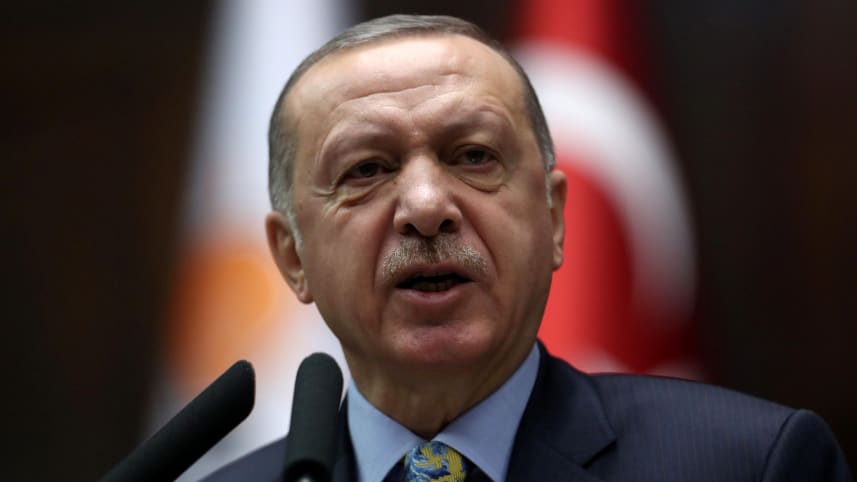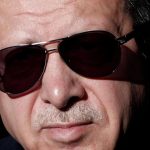By David Rosenberg
When the history of Turkey during the rule of Recep Tayyip Erdogan is written, it will almost certainly go down as an era of lost opportunities whose blame can be squarely placed on no one other than the president himself.
Erdogan’s bizarre and self-serving policies are destroying the Turkish economy. He has undone Turkish democracy to create a personality cult and has left the country virtually friendless by pursing quixotic foreign policy goals.
Even now Erdogan may remain popular with a majority of Turks, but it’s hard to see how they can rightly say that the country is better off. He was given a powerful mandate and is squandering it.
Erdogan’s newest lost opportunity is in energy policy. Geography, geology and demography have all worked to make Turkey a potential energy power, but Erdogan seems intent on doing everything he can to make sure it doesn’t happen.
Can’t do energy blackmail
It’s not that Turkey has much in the way of energy resources of its own, although it may yet discover substantial reserves of gas and oil off its Mediterranean coast one day. But it does have a population of 80 million people and the largest economy in the East Mediterranean, which makes it the most promising customer for the growing quantities of natural gas being discovered by Israel and neighboring countries.
Furthermore, Turkey sits at the crossroads between the vast energy reserves of the Middle East and Central Asia and the giant European market. Turkey is already a transit point for much energy and it aspires to be much more.
Between its role as a major consumer of gas and a transit point for even more, natural gas would not only be a boon to the Turkish economy: it would win Erdogan political power in the region that he so desperately wants. Ankara would be able to set terms and prices, and in extreme cases, even use its position to engage in energy blackmail as Russia has done with Europe in the past.
In an ideal world where cooperation and economic interests were the only factor, much of the gas that has been found in Israel, Cyprus and Egypt (and maybe one day in Lebanon and Syria) would be delivered cheaply and efficiently by pipeline to Turkey. Whatever Turkey itself couldn’t use would be shipped through existing pipelines to Europe, which would like to use the region’s gas to reduce its dependence on Russia.
The fact that this isn’t anywhere close to happening is almost entirely due to Erdogan’s bloody-mindedness and his penchant for making enemies.
Instead of having the emerging East Mediterranean energy hub basing itself in Turkey, as it naturally should, it is being established in the distant second choice location of Egypt.
Picking fights
Possibly one of the most remarkable developments in the Middle East over the last several years is the role of natural gas as a catalyst for economic cooperation. The East Mediterranean Gas Forum launched a month ago between Israel, Egypt, Cyprus, Greece, Jordan and the Palestinian Authority is an unprecedented institutionalization of this, but the fact of the matter is that on a bilateral basis, it has been going on for some time in the form of demarcating Exclusive Economic Zones (EEZs) and gas export deals.
Turkey has found itself on the outside because it has picked fights with all the forum’s key members.
Versus Israel, we’re all too familiar with Erdogan’s angry rhetoric and diplomatic slights. But he also has had cool relations with Egypt since al-Sissi toppled Erdogan’s Muslim Brotherhood allies. Now Ankara is bitterly disputing EEZ rights with Greece.
Against Cyprus, Turkey has pursued the most aggressive policy of all, by denying the island republic any right to explore and exploit its gas reserves until it reaches an agreement with the breakaway Turkish Republic of Northern Cyprus. Erdogan didn’t even cavil at a little gunboat diplomacy, dispatching the navy a year ago to force a drillship operated by the Italian energy company ENI to abandon exploration in what it claimed are waters.
Tensions are so high that when ExxonMobil began its Cyprus drilling shortly afterward, the U.S. Sixth Fleet chose to stage naval exercises nearby to send a message to Ankara.
Turkey’s aggressive policy toward Cyprus not only complicated the island republic’s ability to explore: it threatens plans by Israel and other Mediterranean countries to build a pipeline directly to Europe.
Given Turkey’s attitude, it’s no wonder than Israel and the other East Mediterranean energy powers have overcome their differences and adopt strategies to develop and exports without Turkey.
The catch is that Ankara isn’t about give up – it has and is likely to remain a spoiler so long as Erdogan remains in power.
The reason is that Turkish foreign policy reflects the president’s personal and religious proclivities rather than any realpolitik. Hay Eytan Cohen Yanarocak of Tel Aviv University’s Moshe Dayan Center describes it as a combination of promoting and defending Islam (which precludes good working relations with countries like Israel) and neo-Ottomanism (which aspires to revive Turkey’s former role as regional hegemon and deters it from notion of being an equal partner with neighboring countries).
Perhaps Turkey’s economic woes will push Erdogan out of power or force him to pursue a more modest and realistic foreign policy. For now, however, Turkey is the odd man out, and everyone is the worse off for it.
Source: Haaretz



